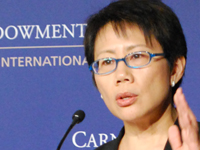Registration
You will receive an email confirming your registration.
China's dominance of the headlines coming out of Asia has many fearing that Hong Kong is dropping off of Washington’s radar at a time when citizens are starting to place greater pressure on their government to obtain a greater measure of autonomy from Beijing.
To get an update on the issue defining Hong Kong today, Carnegie hosted Christine Loh, the CEO of the independent non-profit think tank, Civic Exchange. Carnegie's Doug Paal moderated the discussion.
An Innovation from Beijing
Beijing's policy toward Hong Kong since it gained control of it in 1997 has been based on the “one country, two systems” principle. Deng Xiaoping conceived of this notion
in the early 1980s when negotiating with Britain’s Prime Minister Margaret Thatcher about how to transfer control of Hong Kong back to Beijing. Britain was looking for a way to exit with a sense of honor, and Beijing for a way to retain some degree of control without appearing heavy-handed. Because Hong Kong was capitalist and democratic compared to the rest of China, Beijing sought to absorb it and give it a substantial measure of autonomy without allowing it to operate with total independence.
Striking that middle ground, and concurrently creating a system of elections for Hong Kong that would shift elite loyalties away from Britain and to Beijing, required skillful marketing on the part of the Chinese government; the result was a “United Front” public-relations campaign designed to win the support of Hong Kong residents for integration into the mainland. Beijing established a Hong Kong and Macao Affairs office as an administrative agency of the Chinese State Council to facilitate diplomatic relations between China and Hong Kong. Although nominally independent, then, Hong Kong's government operated under significant constraints.
Frustration with the Government
Thus, Loh noted, although Hong Kong residents felt great excitement during the first elections cycle in 1997, they were frustrated at the government’s lack of independence and agency. Then, as now, the chief executive of Hong Kong is brought to power by a nominating committee whose members are “rubber stamped” by the Chinese government. Hong Kong’s legislature is also limited in its ability to satisfy citizens’ demands; 30 members are elected directly from geographic constituencies, but the remaining 30 are elected from functional constituencies that have vested corporate interests.
Loh emphasized that Hong Kong’s government continues to struggle to establish its legitimacy given the dominant role that Beijing plays in its formation. This is only complicated by the fact that the Commuist Party remains an underground organization without any official legal status in Hong Kong.
The Hong Kong and Macao Affairs Office serves as a “gatekeeper” of mainland-Hong Kong relations, which prevents citizens from having an “ear or an eye” at the ministerial level to ensure that their concerns are voiced effectively. As Loh put it, “Hong Kong sees China moving so fast, but is not sure if it is in for the ride.” Although she noted that Hong Kong residents are generally pleased with the level of stability and security that they enjoy, they resent having to acquire Beijing’s approval to make even modest changes like increasing tourism from Beijing or adding more Chinese companies tp Hong Kong’s stock exchange.
Questions & Answers
Questions addressed how far Hong Kong activists can push before upsetting the "one country, two system" arrangement; the extent to which Beijing intends to use Hong Kong as a site for “experimenting” with liberal economic and political reforms; and the likelihood of mass demonstrations in Hong Kong to commemorate the 20-year anniversary of Tiananmen.
